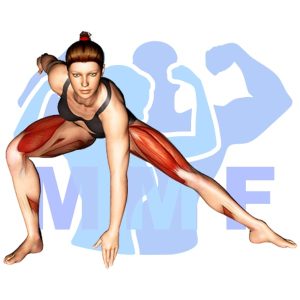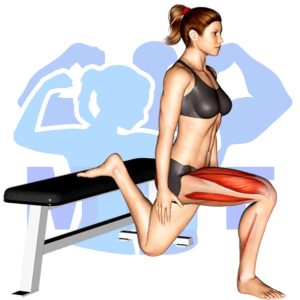Are you tired of your workout routine becoming stagnant? Feeling like exercises are no longer challenging or effective? Look no further than the Smith Rear Lunge. It’s common to hit a plateau, but by switching up your exercises, you can target new muscles and improve your overall fitness. Taking on a new exercise can be intimidating, but don’t worry, we’ve got you covered. In this post, we’ll break down the Smith Rear Lunge, explain why it’s an effective addition to your routine, and walk you through how to execute it properly. Get ready to take your fitness to the next level with the Smith Rear Lunge.
Smith Machine Rear Lunge Summary
- Primary Muscles: Quadriceps
- Secondary Muscles: Gluteus Maximus, Adductor Magnus, Soleus
- Equipment: Smith Machine
- Mechanics Type: Compound
- Force: Push
- Utility: Auxiliary

Smith Machine Rear Lunge Instructions
- Begin by setting the bar on the Smith Machine to shoulder height.
- Step back with one leg, placing the bar across the back of the shoulders.
- Ensure feet are shoulder width apart, with back leg slightly bent.
- Lower the body by bending both knees.
- Keep the front knee in line with the toes, and the back knee in line with the heel.
- Push off the heel of the front foot to return to the starting position.
- Repeat with the opposite leg.
Video Tutorial
Smith Machine Rear Lunge Muscles
Target (Agonist)
Synergists
- Adductor Magnus
- Gluteus Maximus
- Soleus
Dynamic Stabilizers
- None
Stabilizers
- Erector Spinae
- Gluteus Medius
- Gluteus Minimus
- Obliques
- Quadratus Lumborum
Antagonist Stabilizers
- None

Benefits of Smith Machine Rear Lunge
The Smith Machine Rear Lunge is a great exercise for strengthening the quadriceps muscle. It allows for a full range of motion and targets the quads more than any other exercise. This exercise can be done with either a barbell or a Smith Machine, and it can be done unilaterally or bilaterally. When performing this exercise, the back foot should be placed on a block or step to ensure the knee does not go past the toes. This exercise helps to increase strength and stability in the quadriceps, which can help improve performance in other activities. Additionally, the Smith Machine Rear Lunge is a great way to incorporate some balance and coordination into your strength training routine.
Tips for Performing Smith Machine Rear Lunge
If you’re looking for an effective way to increase muscle strength and flexibility in your lower body, the Smith Machine Rear Lunge is a great choice. This exercise can help you improve your balance, coordination, and agility, as well as increase your power and endurance. To make sure you get the most out of the Smith Machine Rear Lunge, follow these tips for optimal performance.
- Make sure to keep your back straight and not arch your back when performing the Smith Machine Rear Lunge. This will help engage the correct muscles and ensure that the movement is performed correctly and safely.
- Control the descent of the exercise, rather than allowing gravity to take over. It’s important to be in control of the movement to ensure correct form and reduce the risk of injury.
- Drive through your heel when pushing back up to the starting position, rather than pushing off with your toes. This will help activate the correct muscles and ensure that the exercise is being performed correctly.
Benefits and Tips Video
Frequent Mistakes To Avoid
It is important to be aware of the common mistakes made when performing Smith Machine Rear Lunges in order to maximize the effectiveness of the exercise and achieve your desired fitness goals. Below is a list of the most common mistakes that you should avoid when performing this exercise. Knowing and avoiding these mistakes will help you get the most out of your workout, and help you reach your fitness goals faster and more effectively.
- Not keeping your chest up and back straight: It is important to maintain proper form throughout the exercise, as slouching can lead to poor posture and cause strain on your lower back.
- Not lowering your body enough: When performing the Smith Machine Rear Lunge, it is important to make sure you are lowering your body as far as possible in order to get the full range of motion from the exercise.
- Not driving through the heel: When you come up from the lunge, you should be pushing off your heel in order to engage your glutes and hamstrings and maximize the benefits of the exercise.
Find More Machine Exercises Here
Variations and Complementary Exercises
It is important to vary your workouts and target the same muscles in different ways. This can help you break through a plateau, challenge your body, and get the most out of your workouts. Here are some alternative, complementary, or variation exercises that work similar muscles as the Smith Machine Rear Lunge:
Plyo Split Squats

Plyo Split Squats are a great alternative or complementary exercise to the Smith Machine Rear Lunge. Plyo Split Squats involve a deep squat position with one foot in front of the other, and then an explosive jump to switch your feet positions and land in a squat. This exercise helps to build power, strength, and agility in the legs and glutes. It also helps with balance and coordination, making it a great supplement to the Smith Machine Rear Lunge. Plyo Split Squats can be done with bodyweight, dumbbells, or weighted plates for an extra challenge.
Plyo Side Lunge

The Plyo Side Lunge is an excellent alternative or complementary exercise to the Smith Machine Rear Lunge. This plyometric exercise focuses on explosive power, engaging the lower body muscles more intensely than the Smith Machine Rear Lunge. It also challenges balance and agility. To perform Plyo Side Lunges, stand with your feet shoulder-width apart and shift your weight to one side. Squat down and jump up explosively and land with your feet together. Repeat the motion for 10 to 15 repetitions and switch sides. Plyo Side Lunges are a great way to increase lower body strength and power.
Half Squat

The Half Squat is an excellent complementary or alternative exercise to the Smith Machine Rear Lunge. It works the same muscle groups as the lunge, but in a slightly different way. The Half Squat focuses on strengthening the glutes, quads, and hamstrings, while also targeting the core muscles. By performing a Half Squat, you are able to focus on the quadriceps more than the glutes and hamstrings. This exercise can be used to increase flexibility and mobility of the lower body, as well as providing a good challenge for the core muscles. Additionally, it is a great way to improve balance and coordination.
Check Out These Top Machine Exercises
Bulgarian Split Squat

The Bulgarian Split Squat is a great exercise to add to your routine if you are looking for an alternative or complementary exercise to the Smith Machine Rear Lunge. This exercise primarily targets the quadriceps and glutes, while also engaging the hamstrings and core. It is a unilateral exercise that requires you to balance on one leg while performing the movement. This places a unique emphasis on balance, stability, and core strength. The Bulgarian Split Squat is a great exercise to challenge your lower body in a different way than the Smith Machine Rear Lunge.
Dumbbell Split Squat

The Dumbbell Split Squat is an excellent alternative or complementary exercise for the Smith Machine Rear Lunge. This exercise primarily targets the quads, glutes and hamstrings, while also incorporating the core muscles. It’s a unilateral movement, meaning it works each side of the body independently, which helps to strengthen and balance any imbalances in the muscles. To perform a Dumbbell Split Squat, stand with your feet staggered, one foot in front of the other, with a dumbbell in each hand. Lower yourself into a lunge position and then press back up to the starting position. This exercise can be done with different variations of foot placement and range of motion. It is an effective way to increase strength and stability in the lower body, making it a great alternative or complementary exercise for the Smith Machine Rear Lunge.
Dumbbell Side Lunge

The Dumbbell Side Lunge is a great complementary or alternative exercise to the Smith Machine Rear Lunge. This exercise focuses on the same muscles as the Smith Machine Rear Lunge, namely the glutes, hamstrings, and quads, however, it also works the adductor and abductor muscles, which are typically neglected in the Smith Machine Rear Lunge. The Dumbbell Side Lunge is a more dynamic exercise than the Smith Machine Rear Lunge, as it incorporates lateral movement and balance. It can be performed with a single dumbbell or two dumbbells, depending on the user’s level of strength and stability. It is a great way to build strength and stability in the lower body, while also working on balance and coordination.
Find More Legs Exercises Here
Opposing Complementary Exercises
In order to maximize your gains, it is important to incorporate exercises that work opposing muscle groups. By doing this, you can ensure that all of the muscles involved in the exercise Smith Machine Rear Lunge are being worked and strengthened properly. Here is a list of exercises that will help you achieve this goal:
Resistance Band Single Leg Curls

The Resistance Band Single Leg Curl is a great exercise to complement the Smith Machine Rear Lunge. This exercise focuses on strengthening the hamstrings and glutes while the Smith Machine Rear Lunge works on strengthening the quadriceps. The Resistance Band Single Leg Curl can be done with either one or two bands and can be used to add resistance as you curl your leg up. By alternating between the two exercises, you can work both the front and back of your legs while also improving your balance and stability.
Resistance Band Leg Curls

Resistance band leg curls are a great way to complement the Smith Machine Rear Lunge exercise. This exercise works the opposing muscle group of the lower body, specifically targeting the hamstrings. Resistance band leg curls involve looping the band around the feet, lying face down and curling your legs towards your glutes. This helps to strengthen and tone the hamstrings and glutes, while also engaging the core muscles. By doing this exercise in conjunction with the Smith Machine Rear Lunge, it helps to create a balanced workout that targets both the quads and hamstrings, promoting stability and strength throughout the lower body.
Smith Machine Single Leg Deadlift

The Smith Machine Single Leg Deadlift is an excellent complementary exercise to the Smith Machine Rear Lunge as it works the opposing muscle group. This exercise is performed by standing on one leg with the other leg lifted slightly off the ground. The bar is then lowered to the ground while keeping the standing leg straight, and then returned to the starting position. The Single Leg Deadlift targets the hamstrings, glutes and lower back muscles, while the Rear Lunge targets the quads, glutes and core muscles. Together, these two exercises work to strengthen and tone all of the major muscle groups in the lower body.
Step Up Your Leg Day with Smith Rear Lunges
If you’re looking to really challenge your leg day routine, try incorporating Smith rear lunges. This exercise targets your glutes, hamstrings, quads, and calves all in one move. By using the Smith machine, you can easily control your form and focus on proper technique. Start with a light weight and gradually increase as you become more comfortable. Don’t be afraid to ask a personal trainer for guidance to ensure you’re performing the exercise correctly and safely.
References: Wikipedia | ExRx.net | PubMed.gov | Comprehensive List of Legs Machine Exercises


